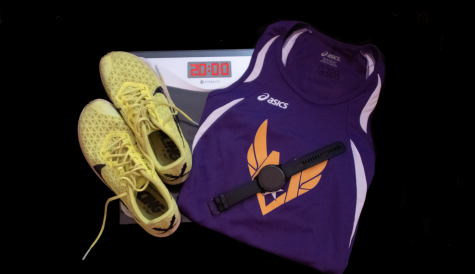Would I be faster if I were skinnier?
Rethinking how MVHS addresses body-image issues in sports
May 8, 2023
Content Warning: This article mentions eating disorders and body image issues.
The first time I felt ashamed of my body was the night after a race. When I crossed the finish line, all I could feel was how badly my legs burned and searing disappointment as I saw the time on the clock. Hours later, I still remembered the bold red 22:27 and how far it was from the 20 minute mark.
Would I be faster if I were skinnier?
My first reaction was to dismiss the thought — I knew thinking about it too much would send me spiraling into a pit of worry and self-doubt. But it was a stubborn idea, always at the back of my mind. When I finally confronted it, it became ingrained in my mind. I started questioning whether I should eat less and drink more water; whether the time on the clock would drop with the number on the scale. I soon found that I was not alone.
Student athletes are at a unique risk for developing body image issues because they are simultaneously teenagers and athletes. Teenagers are vulnerable to developing flawed body image because adolescence is a “pivotal stage in the development of positive or negative body image.” Factors such as puberty, social media and peers can shape teens’ body image, as well as pressure to conform to “socially prescribed body ideals.” Students who participate in endurance sports or sports that emphasize leanness, like gymnastics or dance, are at a higher risk for developing body image issues.
It is ingrained in the culture of many sports — such as gymnastics, football, figure skating and cross-country running — that a specific body type is required to succeed. In fact, 63% of MVHS athletes have experienced body image issues. Despite this, 97% of MVHS athletes find that mental health services at MVHS are not specifically catered towards athletes. Although a school-based therapist is certainly able to address body image issues in students, sports psychologists are much better equipped to take care of athletes’ unique psychological needs. Sports psychologists can also educate coaches — a crucial step in not only addressing body image issues, but being able to provide athletes with appropriate, timely care if their body image issues develop into eating disorders.
Athletes, particularly female ones, are at a higher risk of developing eating disorders than non-athletes, which is only exacerbated by the mentality that “the lighter you are, [the better you perform]” that has woven its way into the culture of several sports — particularly endurance-based sports and performing arts. Eating disorder prevention programs targeting female athletes, which are already extremely limited, are only complicated by the blurred line between desirable traits in athletes and unhealthy extremes. Traits such as perfectionism, excessive exercise and denial of discomfort can be mistaken by athletes and coaches at both the high school and collegiate levels for positive traits such as pursuit of excellence, dedication and performance despite pain.

Training coaches to identify early signs of eating disorders in athletes can help mitigate the harmful effects of eating disorders and teach athletes how to think about nutrition and their own bodies. Coaches in the Central Coast Section are only required to take courses on general coaching, concussions, sudden cardiac arrest and heat acclimatization to get a coaching certification. Implementing a course that teaches coaches how to spot early signs of eating disorders and promote healthy body images would be a pivotal step in addressing the problem, especially because athletes constantly look to coaches for guidance.
In the NCAA, the Female Athlete Body Project, an eating disorder prevention program designed for female athletes, was launched to combat the prevalence of eating disorders. The project, which emphasizes “athletic performance in the context of maintaining [physical, mental, and emotional] health” consists of group exercises that require athletes to “embrace their athlete-specific healthy-ideal, which includes balancing physical, mental and emotional health.”
Implementing a program like the FAB would be a huge step forward in combating body image issues experienced by MVHS athletes, largely because the program is tailored to the athletes themselves. Other measures that are unique to athletes, such as hiring sports psychologists and educating staff and coaches, would establish safe environments for athletes to ask for help and are ultimately necessary to protect MVHS students from body image issues and eating disorders.

















